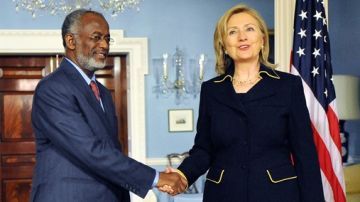Clinton urges resumption of Sudan’s North-South talks
July 10, 2011 (KHARTOUM) – North and South Sudan must quickly resume talks on post-secession arrangements and address their own internal challenges, US secretary of state Hillary Clinton said on Saturday.

She warned, however, that the prospect for lasting peace between the two nations could fade unless their leaders take “decisive steps to consolidate progress.”
“First, they must quickly return to the negotiating table and seek to complete the unfinished business of the Comprehensive Peace Agreement. That means settling outstanding questions related to finances, oil and citizenship; demarcating remaining border areas; and fully implementing their agreement on temporary arrangements for the contested Abyei area” she wrote, adding that “the violence that has flared in Abyei in recent months cannot be allowed to return and jeopardize the larger peace.”
North and South Sudan have been engaged in talks with little progress on a raft of issues related to the bifurcation of the country, including citizenship, sharing of oil and water resources, external debts, currency, assets and international treaties and conventions.
Tension between the ex-war foes flared up last month as North Sudan army wrestled control of the hotly-contested region of Abyei in retaliation for an attack allegedly carried out by southern troops.
Concerns of a possible return to North-South was were further stoked by the outbreak in early June of clashes in the northern border state of South Kordofan between Sudan army and forces aligned with South Sudan.
The fighting, which escalated into artillery and aerial bombardment, has so far forced more than 70,000 people to flee their homes.
“One urgent step both sides must take is agreeing to a cessation of hostilities in the northern border state of Southern Kordofan,” Clinton wrote, saying that her country is deeply concerned about the continued aerial bombardments, harassment of U.N. staff and obstruction of humanitarian relief efforts.
“The longer this fighting goes on, the more difficult it will become to resolve,” she cautioned.
A framework agreement was signed late last month between north Sudan’s ruling National Congress Party (NCP) and the Sudan People’s Liberation Movement in North Sudan on new grounds for political and security arrangements in South Kordofan, including integration of forces and a cease-fire.
However, the deal was thwarted by NCP hardliners who objected to the agreement’s recognition of the SPLM as a “legal political party” in North Sudan, mirroring previous assertions by NCP officials that the SPLM would not be allowed to operate in the North after independence, calling it an extension of a foreign party.
Clinton addressed North and South Sudan respectively, saying that both sides must address internal challenges. South Sudan, Clinton wrote, needs “to begin building an effective, democratic and inclusive government that respects human rights and delivers services with transparency and accountability.”
She said that the normalisation of relations between the US and North Sudan, along with all the benefits that come with it including international financing, investment and debt relief, is dependent on the north’s commitment “to peace within its borders and with its neighbors.”
Clinton reiterated her country’s concerns over stability in Sudan’s western region of Darfur, saying that the Sudanese government must move “to address the economic and political grievances of the Darfuri people, and to hold perpetrators accountable for their crimes.”
Three Sudanese individuals including the country’s president Omar Hassan Al-Bashir are wanted by the International Criminal Court (ICC) on charges of war crimes, crimes against humanity and genocide allegedly committed during the protracted conflict in Darfur which erupted in 2003 after ethnic rebels took up arms against the government, accusing it of neglecting the region.
A counterinsurgency campaign by the Sudanese army and its allied militia is blamed for the death of thousands and displacement of millions in Darfur.
(ST)
